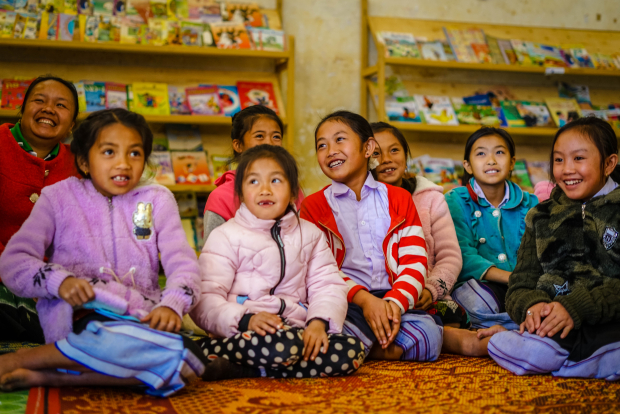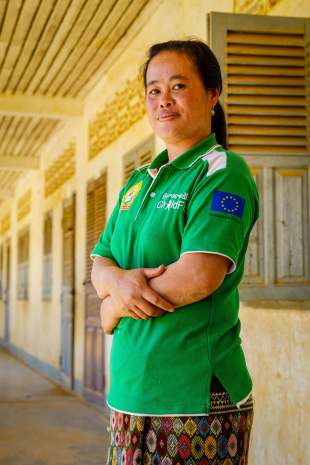All children deserve the joy of reading books
Discussion details
The ability to read is critical to a child's success in school, and later in life. Children who cannot read, cannot learn. Reading books helps children to learn sounds, words and language, and develop early literacy skills.
In Lao PDR, significant progress has been made achieving 98.6% primary net enrolment. However, there are major challenges in delivery of education in remote and hard to access areas. Many non-Lao-Tai (ethnic persons) children live in remote villages and they only learn Lao language when they first start to school. Girls, particularly those from ethnic minority groups, often experience later starts in education, delaying their Lao language acquisition and creating life-long disadvantage through dropout and low levels of literacy.[1]
Basic Education Quality and Access in Lao PDR (BEQUAL) is a programme supporting the Ministry of Education and Sports in the implementation of its education strategic plan. It is funded by the EU and Australia. Its goal is: “more girls and boys, especially those experiencing disadvantages, complete good quality basic education, achieving literacy, numeracy and other life skills”.
Identifying literacy and language skills as key to educational success, BEQUAL rallied civil society and communities to encourage children to read.
The BEQUAL NGO consortium comprised of Plan International, Save the Children, ChildFund and World Vision helped establishing book banks and mobile libraries in 171 disadvantaged schools and villages.[2] From beginning of 2016 to end of 2018, more than 43,000 books were distributed[3].
|
Ms Phouang Bounmeexay, a 28 year-old teacher at Pawan Primary School, Xamneua District has received three bookshelves. She notes that “this has motivated students, including non-Lao speaking students in our village, who are not confident in reading in Lao language, to come and look at the books and talk about pictures”. |

In a context where reading is low among teachers, parents and children, the consortium engaged parents and communities to promote a love of reading and increase awareness on the importance of reading books for children’s intellectual development. Through community-based literacy and reading promotion activities, classroom learning was extended outside of school hours and children’s participation in reading and demand for materials are improved.[4]

Under BEQUAL, 616 (267 females) village volunteers were recruited to regularly read books to children. Workshops for families in each target village were held to increase parents’ knowledge and skills to support reading at home.
Thanks to increased access to books and reading promotion in the community, students have started to read more at home and at school. The proportion of children who have access to story books at home increased from 64% (2016) to 98% in 2018. Most students were also reading story books at school; 87% of the girls and 84% boys read at school.[5]
|
“Children can remember the picture of animals [in the story] and meaning of the words because they have opportunity to see the pictures from storybooks and cards, which is different from our old style-telling story to children.” A volunteer from Makphouk village, Nambak district, Luang Prabang province. BEQUAL NGO Consortium Final Evaluation Report |

|
“Lessons learned: 1. Recruiting and retaining village volunteers to conduct reading promotion has proved to be a challenge for community - based reading promotion. The risk of ineffectiveness due to high turnover of volunteers and low literacy among volunteers needs to be addressed as part of the activity plan. Alternatively, if teachers are to conduct reading promotion outside of lessons, appropriate support to manage workload, capacity building and incentives (monetary and in-kind) would also be required to ensure effectiveness. Recommendation: The use of stipends for volunteers or teachers to conduct reading promotion is an effective incentive, however program planning for the phase out of such incentives should be included in the program close out plan. 2. Reading behaviour of students, particularly those in early grades, reveal that reading outside of the classroom often takes place with older siblings. This makes sense in a context where children have responsibilities for caring and domestic work. Recommendation: Future reading promotion activities should consider including older siblings in group reading, buddy reading activities and workshops to develop and tap into this community resource.” From the BEQUAL NGO Consortium Final Evaluation Report |
[1] Investment Design Document, p. 14
[2] BEQUAL NGO Consortium Final Evaluation Report, p. 27-28 http://www.bequal-laos.org/wp-content/uploads/2019/03/BEQUAL-NGO-Consortium-Final-Evaluation-Report_Jan2019_for-publication.pdf
[3] http://www.bequal-laos.org/community-action-for-reading-promotion/
[4] BEQUAL NGO Consortium Final Evaluation Report, p. 3
[5] Ibid., p. 2
Photo credits: ChildFund

Log in with your EU Login account to post or comment on the platform.